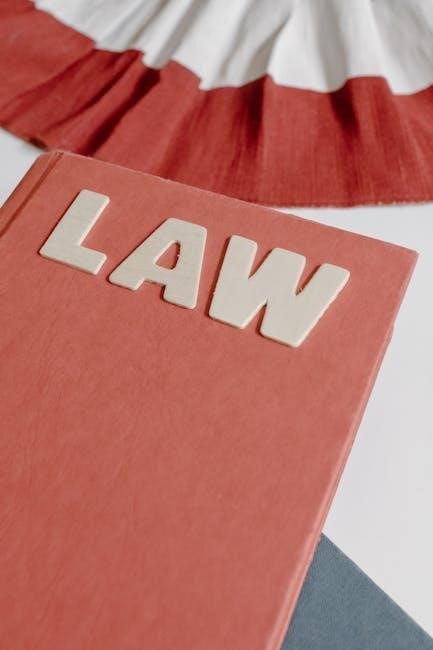Law school personal statements are critical for showcasing applicants’ unique qualities and experiences․ Examples in PDF formats‚ like those from the University of Toronto Faculty of Law‚ provide insights into crafting compelling narratives that highlight personal growth‚ career goals‚ and motivations for pursuing a legal education․
1․1 Importance of a Personal Statement in Law School Applications
A personal statement is crucial for law school applications‚ as it distinguishes applicants beyond grades and LSAT scores․ It provides insight into an applicant’s unique experiences‚ motivations‚ and career goals․ Examples‚ such as those from the University of Toronto‚ highlight how a well-crafted statement can showcase personal growth and a commitment to legal education․
1․2 Overview of the Law School Application Process
The law school application process involves submitting transcripts‚ LSAT scores‚ letters of recommendation‚ and a personal statement․ Each component is essential‚ but the personal statement stands out as it allows applicants to share their unique story․ Examples from sources like the University of Toronto illustrate how a compelling narrative can highlight an applicant’s potential and motivations for pursuing a legal education․
Understanding the Purpose and Significance
The personal statement is a chance to shine‚ offering a compelling picture of yourself beyond grades and LSAT scores‚ showcasing unique qualities and motivations for law school․
2․1 What Law Schools Look for in a Personal Statement
Law schools seek a genuine‚ well-structured narrative that highlights unique qualities‚ motivations‚ and experiences․ They look for clarity‚ passion‚ and evidence of how your background prepares you for a legal career․ A compelling statement should distinguish you‚ showcasing your potential to contribute meaningfully to their program and the legal profession․
2․2 Differentiating Yourself from Other Applicants
To stand out‚ your personal statement must offer a unique perspective‚ showcasing experiences and traits that set you apart․ Highlight specific anecdotes‚ skills‚ or values that demonstrate your individuality․ Tailor your narrative to align with the law school’s values‚ ensuring your story resonates distinctly among thousands of applicants‚ making your application memorable․
Structuring Your Personal Statement
A well-structured personal statement begins with a strong introduction‚ followed by a body that shares personal and professional experiences‚ and concludes with a summary of career goals and aspirations․
3․1 How to Start Your Personal Statement
Begin your personal statement with a compelling narrative or anecdote that captures your unique perspective and motivation for pursuing law․ Clearly articulate your career goals and how law school aligns with your aspirations․ Tailor your introduction to each school‚ demonstrating genuine interest and understanding of their values․ Avoid clichés and ensure your voice shines through․
3․2 The Body: Sharing Personal and Professional Experiences
In the body‚ highlight meaningful personal and professional experiences that reveal your character‚ skills‚ and motivations․ Use specific examples to demonstrate how these experiences have prepared you for a legal career․ Reflect on challenges overcome and lessons learned‚ showcasing growth and resilience․ Ensure each story ties back to your future goals and passion for law․
3․3 Concluding Your Statement: Summarizing Your Goals
The conclusion should succinctly summarize your aspirations and how law school aligns with your vision․ Reaffirm your commitment to a legal career and highlight what you bring to the program․ End with a strong‚ memorable statement that reinforces your passion and readiness to contribute to the legal field․

Key Elements to Include
A strong personal statement should include personal anecdotes‚ academic achievements‚ and professional experiences that showcase your unique background and motivation for pursuing a legal education․
4․1 Personal Anecdotes and Life Experiences
Personal anecdotes and life experiences are essential for creating a compelling narrative in your law school personal statement․ Examples from successful applicants‚ such as overcoming challenges or meaningful career moments‚ demonstrate resilience and purpose․ These stories should highlight your unique perspective and how they have shaped your motivation to pursue a legal career․
4․2 Academic and Professional Background
Highlighting your academic achievements and professional experiences is crucial․ Emphasize relevant coursework‚ internships‚ or jobs that demonstrate your commitment to law․ For example‚ working at a law firm or participating in moot court competitions showcases your practical understanding and readiness for legal studies․ This section should connect your past experiences to your future aspirations in law․
4․3 Demonstrating Motivation and Career Goals
Clearly articulate your motivation for pursuing a law degree and outline specific career objectives․ Examples from successful applicants often illustrate how their experiences align with their aspirations․ For instance‚ a desire to advocate for human rights or combat systemic injustices should be linked to how law school will equip you to achieve these goals effectively․
Common Mistakes to Avoid
Avoid generic statements and ensure your essay is focused and well-structured․ Poor grammar‚ clichés‚ and lack of originality can weaken your application․ Be concise and authentic․
5․1 Being Too Generic or Cliché
Avoid using overly generic statements that fail to distinguish you from other applicants․ Instead‚ focus on unique experiences and perspectives; Highlight specific anecdotes or motivations that showcase your authenticity․ Successful examples from the University of Toronto demonstrate how personal stories can convey genuine passion and ambition‚ making your statement memorable and impactful․
5․2 Lack of Focus or Clear Narrative
A meandering or disjointed personal statement can confuse admissions committees․ Avoid vague descriptions and ensure your essay has a clear structure․ Use specific examples‚ like those in University of Toronto’s PDF guides‚ to create a cohesive narrative․ Demonstrating a well-defined purpose and logical flow will leave a lasting impression on reviewers․
5․3 Poor Writing and Grammar
Sloppy writing and grammatical errors undermine credibility; Law schools expect polished prose‚ as seen in University of Toronto’s PDF examples․ Ensure your statement is free of typos and demonstrates strong command of English․ Professional proofreading and multiple revisions are essential to present a flawless narrative that showcases your intellectual readiness for legal studies․
Examples and Resources
The University of Toronto Faculty of Law offers PDF examples of successful personal statements‚ providing insights into effective storytelling and structure; These resources highlight how applicants can articulate their unique experiences and goals clearly‚ demonstrating their readiness for a legal education and career․
6․1 Where to Find Law School Personal Statement Examples
Law school personal statement examples can be found on official university websites‚ such as the University of Toronto Faculty of Law‚ and through resources like LSAC․ These examples provide insights into effective storytelling‚ showcasing personal anecdotes‚ and articulating career motivations․ They serve as valuable guides for crafting a compelling and structured narrative․
6․2 Analyzing Successful Personal Statements
Successful personal statements often share common traits‚ such as a strong narrative voice‚ clear career goals‚ and meaningful personal anecdotes․ By examining examples from admitted students‚ applicants can identify these key elements and incorporate them into their own writing․ This analysis helps in crafting a unique and impactful personal statement tailored to law school admissions․
6․3 Using PDF Guides and Templates Effectively
PDF guides and templates offer valuable frameworks for structuring your personal statement․ They provide examples of successful essays‚ highlighting key elements like clarity‚ conciseness‚ and impactful storytelling․ Utilizing these resources helps ensure your statement is well-organized and tailored to showcase your unique strengths and alignment with the law school’s values․

Writing About Diversity and Unique Perspectives
Your unique background and experiences are vital in crafting a compelling personal statement․ Highlighting diversity enriches your narrative‚ showcasing how your perspective will contribute to the law school community․
7․1 The Role of a Diversity Statement
A diversity statement highlights your unique background and experiences‚ complementing your personal statement․ It explains how your perspective will enrich the law school community and demonstrates your commitment to diversity and inclusion․ This statement connects your personal story to your motivation for studying law and your career goals‚ showcasing your potential to make a meaningful impact․
7․2 How to Highlight Your Unique Background
To emphasize your unique background‚ focus on personal anecdotes‚ cultural influences‚ and life experiences that shaped your perspective․ Showcase how your identity‚ upbringing‚ and challenges have prepared you for law school and a legal career․ Use specific examples to illustrate your resilience‚ adaptability‚ and commitment to fostering inclusivity and understanding in diverse environments․
Tailor your personal statement by researching each law school’s values‚ culture‚ and programs․ Customize your narrative to align with their specific mission and offerings‚ ensuring a personalized appeal that demonstrates genuine interest and fit for each institution․ Researching a law school’s values and culture involves understanding their mission‚ faculty expertise‚ and community engagement․ Review websites‚ speak to alumni‚ and analyze curricula to identify unique offerings․ Aligning your personal statement with these elements demonstrates tailored interest and a genuine understanding of how the school aligns with your goals and aspirations․ Tailoring your personal statement for each law school requires addressing specific prompts and highlighting relevant experiences that align with the school’s unique culture․ Customize by mentioning particular programs‚ professors‚ or opportunities at each institution․ This demonstrates genuine interest and shows how you plan to contribute to their distinct academic community and environment․ The writing process involves brainstorming‚ outlining‚ and drafting to create a compelling personal statement․ Examples from successful applicants highlight the importance of clarity‚ focus‚ and authenticity in each draft‚ ensuring a narrative that resonates with admissions committees and distinguishes the applicant․ Brainstorming and outlining are essential steps in crafting a law school personal statement․ Start by reflecting on your motivations‚ experiences‚ and goals․ Identify key themes and anecdotes that highlight your unique qualities․ Use mind mapping or lists to organize your ideas‚ ensuring a logical flow․ Referencing examples from PDF guides can inspire your structure and content‚ helping you create a compelling narrative․ When drafting your law school personal statement‚ start with a strong opening that captures attention․ Use clear‚ concise language to convey your story and goals․ Revise multiple times‚ ensuring each paragraph flows logically․ Seek feedback from mentors and proofread for clarity and grammar․ Examples from PDF guides can serve as models to refine your narrative effectively․ Seeking feedback from mentors or advisors is crucial for refining your personal statement․ Their insights can enhance clarity and impact‚ ensuring your narrative resonates with admissions committees․ Seeking feedback from mentors or advisors is a vital step in refining your personal statement․ Their objective perspective can help identify strengths and areas for improvement‚ ensuring your narrative is coherent and impactful․ Additionally‚ mentors can provide insights into how well your experiences align with the values of the law schools you’re applying to‚ helping you tailor your statement more effectively․ Proofreading is essential for a polished personal statement․ Ensure grammar‚ spelling‚ and punctuation are flawless‚ as errors may detract from your professionalism․ Double-check formatting requirements for each school‚ such as page limits and font styles․ Submitting your statement well before deadlines allows time for unexpected technical issues․ A meticulous review ensures your application makes a strong impression․ A well-crafted personal statement is your chance to shine‚ showcasing your unique journey and aspirations․ It leaves a lasting impression‚ demonstrating your potential to excel in law school and beyond․ A well-crafted personal statement leaves a lasting impression‚ distinguishing you from thousands of applicants․ It reflects your unique journey‚ motivations‚ and career aspirations‚ showcasing your potential to excel in law school and beyond․ By highlighting your unique perspectives and experiences‚ it complements your academic and professional background‚ making your application stand out effectively․ Crafting a compelling narrative is essential for a standout personal statement․ Use specific examples and anecdotes to illustrate your strengths‚ values‚ and goals․ Tailor your statement to each school‚ ensuring it reflects their unique values․ Edit rigorously and seek feedback to refine your voice․ A polished‚ authentic narrative will leave a lasting impression on admissions committees․Tailoring Your Statement for Different Schools
8․1 Researching the Law School’s Values and Culture
8․2 Customizing Your Statement for Each Application

The Writing Process
9․1 Brainstorming and Outlining Your Ideas
9․2 Drafting and Revising Your Statement

Seeking Feedback and Finalizing
10․1 Getting Feedback from Mentors or Advisors
10․2 Final Tips for Proofreading and Submission
11․1 The Lasting Impact of a Well-Written Personal Statement
11․2 Final Thoughts on Crafting a Compelling Narrative
